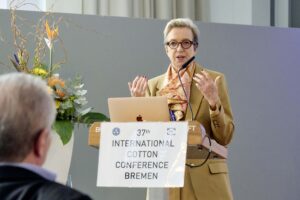The European Ecodesign Directive will be succeeded by a new Ecodesign for Sustainable Products Regulation (ESPR) as part of the European Green Deal.
The EU Commission has presented an update of EU consumer regulations as part of the “Green Deal”. The two legislators, the European Parliament and the Council of the EU, have provisionally agreed on the new rules on ecodesign. The law has yet to be formally adopted. However, at the International Cotton Conference Bremen in March 2024, ESPR received clear and fundamental criticism from experts.
Aim of the ESPR Requirements
Under the ESPR, ecodesign requirements can be set for certain product categories in order to measure their recyclability, energy efficiency, resource efficiency and other environmental sustainability characteristics. The aim is to improve the environmental performance of products throughout their life cycle – from production to disposal. The destruction of usable consumer goods such as textiles and shoes should be stopped. This means that only products that have been manufactured in a resource-saving manner, are durable, repairable and energy-efficient should be placed on the domestic market.
Textiles Prioritized in the ESPR
The draft presented in January by the European Commission’s Joint Research Center (JRC) contains proposals for the product groups that should be prioritized once ESPR comes into force, as well as proposals for policy approaches. Textiles and footwear are identified as the product group with the greatest impact.
The EU Commission’s proposal aims to achieve the following: Textile products placed on the EU market should be more durable and recyclable by 2030 at the latest, made from recycled fibers as far as possible and free from hazardous substances. Social rights and the environment should be respected during production. Consumers should be able to use high-quality textiles for longer, “fast fashion” should go out of fashion and economically viable reuse and repair services should be generally accessible. In a competitive, resilient and innovative textile sector, manufacturers must take responsibility for their products along the entire value chain, right through to disposal.
Strong Criticism at the Bremen Conference

In her presentation at the International Cotton Conference Bremen in March 2024, analyst Veronica Bates Kassatly demonstrated the gaps in the regulation very clearly.
The Ecodesign Regulation for Sustainable Products would set requirements for textiles and clothing to improve their sustainability. However, according to Bates, the proposed requirements are not consistent with the European Union’s commitments under the Paris Agreement, the Kunming-Montreal Global Biodiversity Framework, the Sustainable Development Goals and the WTO.
The data used to inform the requirements are out of date and often in error by several magnitudes. The shortcomings of the proposed requirements in ESPR are attributable, at their base, to a failure by the EU to commission the research required to underpin effective legislation.
Bates explained that when it comes to sustainability, the questions to ask are: How will poverty and hunger be reduced? How will emissions be reduced equitably? How will both biodiversity and the income and prospects of local – and especially indigenous – populations be preserved?
The current Ecodesign Regulation proposal does not include a requirement to incentivize the consumption of natural plant fibers. The ESPR proposal includes two performance requirements that specifically target cotton’s use of water, fertilizers and pesticides, but say nothing about cotton’s role in reducing poverty and hunger. There are also no corresponding requirements for polyester, which would allow the proposed ESPR regulation to fulfill Europe’s stated intention to phase out fossil fuels.
Performance Requirements Not Fair
ESPR also proposes to create a performance requirement for the minimum content of sustainability certified material per kilogram or unit of textiles and footwear. However, there are no sustainability certificates for pure polyester, even though this fiber accounts for over 50 percent of the global fiber supply. The questions of whether the hazardous substance antimony was used in the production of polyester or whether its production poses an “unreasonable risk” to workers and local communities through the release of carcinogenic 1,4-dioxane is as important to health as the toxicity of pesticides and fertilizers, Bates explained.
ESPR and Global Obligations
According to the analyst, ESPR adds yet another level at which the EU is failing to meet its global obligations under its planned sustainability legislation: non-compliance with WTO rules. When the EU imposes the aforementioned performance requirements on cotton-containing products, it creates non-tariff or “technical” barriers to trade. These are regulated by the Uruguay Round Agreement on Technical Barriers to Trade. Technical regulations may not restrict trade more than is necessary to achieve a legitimate objective.
Read the entire analysis from Veronica Bates Kassatly here: ESPR Report

